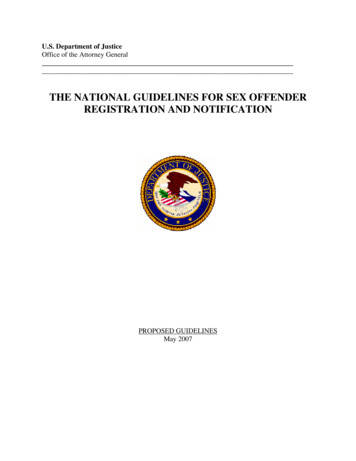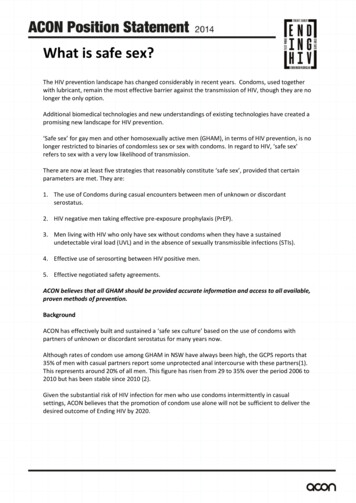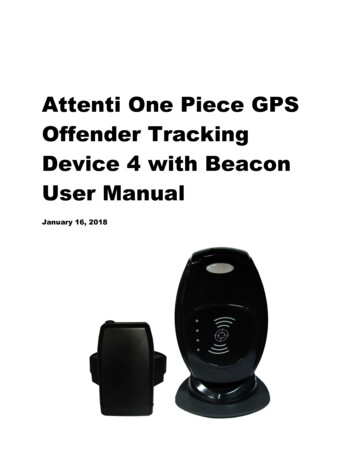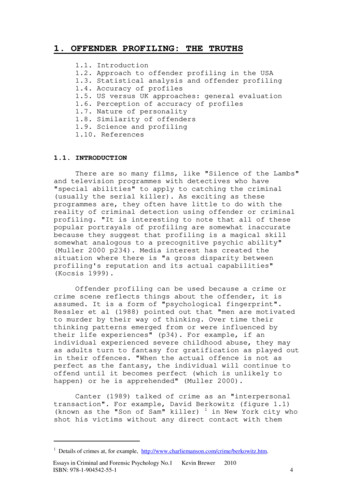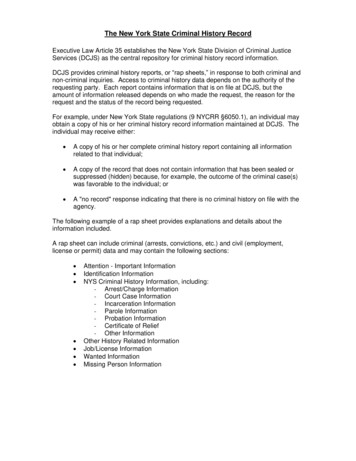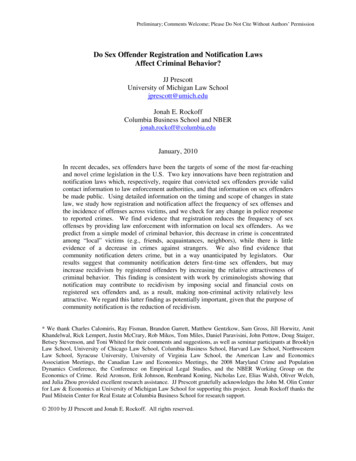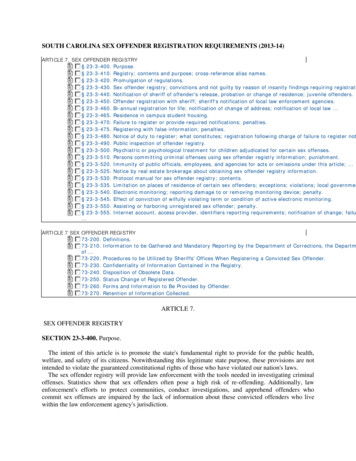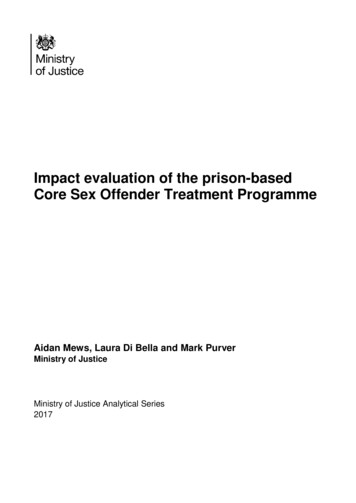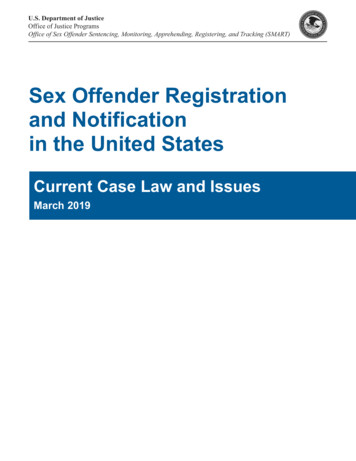
Transcription
Sex Offender Registrationand Notificationin the United StatesCurrent Case Law and IssuesMarch 2019
Sex Offender Registration and Notification in the United States: Current Case Law and IssuesMarch 2019ContentsI.Overview of U.S. Sex Offender Registration . 1Registration is a Local Activity . 1Federal Minimum Standards . 1National Sex Offender Public Website . 1Federal Law Enforcement Databases . 2Federal Corrections . 3Federal Law Enforcement and Investigations. 3II.Who Is Required to Register? . 3‘Conviction’ . 3‘Sex Offenders’ . 4‘Catch-All’ Provisions . 4Comparable Convictions from Other Jurisdictions . 4Elements vs. Facts . 5Recidivists. 5III.Registration of Juvenile Offenders . 5Juvenile Registration Requirements Vary Across Jurisdictions . 6Issues Unique to Juvenile Adjudications . 6Federal Juvenile Delinquency Act . 6IV.V.Military Registration . 6Retroactive Application & Ex Post Facto Considerations.7United States Supreme Court . 8Federal Courts . 8Significant State Court Decisions . 8Additional Court Opinions . 8VI.Other Constitutional Issues . 9Varied Successful Challenges . 9Interaction Between SORNA and State Law .10Jury Determination of Obligation to Register as a Sex Offender .10Ineffective Assistance of Counsel .10VII.Sex Offender Registration and Notification in Indian Country . 11Tribal Residents and State Registration Responsibilities . 11VIII.Failure to Register .12Failure to Register as a ‘Continuing Offense’ . 12Failure to Register as a ‘Strict Liability’ Offense . 12‘Incarceration’ as It Affects Registration Responsibilities . 12
Sex Offender Registration and Notification in the United States: Current Case Law and IssuesMarch 2019Notice.12Prosecution Based on Failure to Update Information . 12Venue .12IX.X.Residency Restrictions . 13Miscellaneous . 13Defamation . 13Fair Credit Reporting Act . 13Federally Assisted Housing .14Homeless & Transient Offenders . 14Immigration & Deportation . 14Impeachment. 15Sentencing Enhancement Under Federal Law . 15XI.Conclusion . 15Endnotes .16Disclaimer: The U.S. Department of Justice makes no claims, promises or guarantees about the accuracy, completeness or adequacy of the contents of this update, and expressly disclaims liability for errorsand omissions in the contents of this update. The information appearing in this update is for generalinformational purposes only and is not intended to provide legal advice to any individual or entity. Weurge you to consult with your own legal advisor before taking any action based on information appearingin this update.
Sex Offender Registration and Notification in the United States: Current Case Law and IssuesI.March 2019Overview of U.S. Sex Offender RegistrationSex offender registration and notification schemes have existed in the United States fordecades. These systems are loosely referred to as sex offender registries. We begin this summarywith an outline of those systems.Registration is a Local ActivityIn the United States, sex offender registration is conducted at the local level. Generally,sex offenders in the United States are required to register with law enforcement in each state,locality, territory or tribe where they reside, work or attend school. 1 Every U.S. state, the Districtof Columbia, the five principal U.S. territories and approximately 150 federally recognized Indiantribes have their own sex offender registration and notification systems. 2 Every one of these systems has its own nuances and distinct features. Every jurisdiction (state, territory and tribe)makes its own determinations about who is required to register, what information offenders mustprovide, which offenders are posted on the jurisdiction’s public registry website, and so forth.Although the federal government does not directly administer sex offender registries, it isinvolved in sex offender registration and notification in meaningful ways. 3Federal Minimum StandardsCongress has enacted various measures setting “minimum standards” for jurisdictions toimplement in their sex offender registration or notification systems. 4 The first of these was passedin 1994 and is commonly referred to as the “Wetterling Act.” This Act established a set of minimum standards for registration systems for the states. 5 Two years later, Congress passed “Megan’sLaw” as a set of minimum standards for community notification. 6 The current set of standards —the Sex Offender Registration and Notification Act (SORNA) — was passed in 2006. 7If a state, tribe or territory chooses not to substantially implement SORNA’s standards,the jurisdiction risks losing 10 percent of its Edward R. Byrne Justice Assistance Grant (ByrneJAG) funds. 8 As of March 1, 2019, 17 states, four territories and over 130 federally recognizedIndian tribes have substantially implemented SORNA. 9 Among jurisdictions that have substantially implemented SORNA, registration and notification laws vary. 10 Practitioners are advised tobecome familiar with the specific registration and notification systems in all jurisdictions wherethey plan to work.National Sex Offender Public WebsiteThe National Sex Offender Public Website (NSOPW), located at www.nsopw.gov, was created by the U.S. Department of Justice in 2005 and is administered by the Office of Sex OffenderSentencing, Monitoring, Apprehending, Registering, and Tracking (SMART Office). 11 NSOPWworks much like a search engine: Jurisdictions connect their public sex offender registries toNSOPW by way of a web service or automated upload to enable NSOPW to query the jurisdictions’websites. Only information that is publicly listed on a jurisdiction’s public sex offender registrywebsite will display in NSOPW’s search results. The Department of Justice does not administerthe registration information searched for or displayed on NSOPW, and only ensures that jurisdictions’ registries can be queried through and results displayed on NSOPW. 12SMART Office SMART.gov1
Sex Offender Registration and Notification in the United States: Current Case Law and IssuesMarch 2019Note that some jurisdictions do not post information about all of their registered offenders on their public registry website: A search of NSOPW is not a comprehensive search of all registered offenders nationwide.The National Sex Offender Public Websitewww.nsopw.govFederal Law Enforcement DatabasesFederal databases are utilized by law enforcement across the country to access accurateinformation about registered sex offenders. Registering agencies and other law enforcement entities submit the information necessary to populate these databases: 13 The National Sex Offender Registry (NSOR) is a law-enforcement only database that is afile of the National Crime Information Center (NCIC) database managed by the FederalBureau of Investigation (FBI) Criminal Justice Information Services (CJIS) division. Itwas created in the late 1990s to store data on every registered sex offender in the UnitedStates, and to provide law enforcement nationwide access to that data. 14The Next Generation Identification (NGI) system officially replaced the legacy fingerprintdatabase at the FBI (IAFIS) in 2014. 15 NGI fingerprint records are linked to the offender’scorresponding NSOR record at CJIS. The National Palm Print System (NPPS) is the database for palm prints housed at the FBI. The Combined DNA Index System (CODIS) is the national DNA database administered bythe FBI.SORNA requires that jurisdictions submit information on all of their registered sex offenders to NSOR, and ensure that all of their offenders’ fingerprints have been submitted to NGI,palm prints to NPPS and DNA profiles to CODIS. 16SMART Office SMART.gov2
Sex Offender Registration and Notification in the United States: Current Case Law and IssuesMarch 2019Federal CorrectionsThe federal government is also involved with sex offenders housed in federal correctionalinstitutions. Specifically, some federal government agencies are required to notify local law enforcement when a sex offender is released from federal custody. Military detention issues are discussed in the section on military registration.The Bureau of Prisons (BOP) does not register sex offenders prior to their release fromincarceration, as registration is primarily a function of state, territory and tribal governments.However, 18 U.S.C. § 4042(c) requires that BOP or a federal probation officer notify the chief lawenforcement officer and registration officials of the appropriate state, tribe or local jurisdictionwhenever a federal prisoner required to register under SORNA is released from custody. 17 In 2014,BOP issued guidelines governing its release of sex offenders. 18The Bureau of Indian Affairs (BIA), as an agency of the Department of the Interior, is notgoverned by the terms of 18 U.S.C. § 4042(c). There are no generally applicable statutory or administrative requirements for the BIA-operated detention centers (approximately one-quarter ofthe 90 BIA detention centers) to notify local law enforcement when a sex offender is released fromcustody. 19The Department of Homeland Security’s (DHS) Immigration and Customs Enforcement(ICE) Enforcement and Removal Operations (ERO) is generally responsible for detaining and deporting undocumented individuals who are present within the United States. In 2015, DHS issueda rule amending its Privacy Act provisions to permit the transfer of information from DHS to anysex offender registration agency about an offender who is released from DHS custody or removedfrom the United States. 20 Like the Bureau of Prisons and BIA detention facilities, offenders arenot registered prior to their release from ICE custody.Federal Law Enforcement and InvestigationsSORNA designated the United States Marshals Service as the lead agency in investigationsof suspected violations of the federal failure to register statute, 18 U.S.C. § 2250. To further itsinvestigative capacity, the USMS established the National Sex Offender Targeting Center in2009. 21II.Who Is Required to Register?Nearly all registration requirements in the United States are initially triggered by a conviction of a criminal offense. Most jurisdictions limit their registration and notification systemsto persons convicted of sex offenses and nonparental kidnapping of a minor. Some states alsoinclude other offenders in their registration and notification systems, or have separate offenderregistries for nonsexual offenses. 22‘Conviction’When a person is found guilty and sentenced for a sex offense, SORNA requires that theperson be subject to sex offender registration and notification requirements. However, certainfindings other than guilty can also trigger a registration requirement. Withheld adjudications haveSMART Office SMART.gov3
Sex Offender Registration and Notification in the United States: Current Case Law and IssuesMarch 2019been held to require registration under SORNA. 23 In some jurisdictions, registration is requiredwhen a person has been civilly committed, received a withheld adjudication, found “Not Guilty byReason of Insanity” or incompetent to stand trial, or when ordered to register by a probation officer. 24 In addition, some jurisdictions require registration even if an offender has been pardonedfor the underlying offense, 25 had their underlying complaint dismissed and pleas vacated under aspecial statutory procedure, 26 had their conviction for a sex offense vacated on double jeopardygrounds, 27 and, in some jurisdictions, an offender can remain on the public registry website evenif that offender no longer has any meaningful ties to the jurisdiction. 28‘Sex Offenders’Federal courts have interpreted SORNA as directly imposing a duty on a person to attemptto register if they meet the federal definition of “sex offender.” 29 SORNA’s standards call for jurisdictions to register all persons who have been convicted of a tribal, territory, military, federal orstate sex offense. 30 In addition, certain foreign sex offense convictions will also trigger a registration requirement under SORNA. 31 In practice, a jurisdiction generally will not register an offenderunless that jurisdiction’s laws require that the offender be registered. 32 At least one state hasconcluded that if a person has ever been required to register as a sex offender pursuant to federallaw, that person is required to register in the state. 33 In addition, at least one state imposes theregistration requirements of the originating state, even if the receiving state’s requirements areless stringent. 34KidnappingThe inclusion of kidnapping offenses in sex offender registration systems is a legacy of thefirst federal legislation regarding sex offender registration in 1994. 35 Inclusion of kidnapping offenses in a jurisdiction’s sex offender registry has been largely upheld by the courts. 36‘Catch-All’ ProvisionsWhen jurisdictions specifically outline the offenses that require registration, there is littlequestion as to who is required to register. Many jurisdictions also include catch-all provisions,which, in varying forms, require any person convicted of an offense that is “by its nature a sexoffense” to register. One court concluded that the state need only prove by “clear and convincing”evidence that an offender engaged in sexual contact to qualify under its catch-all registration provision, 37 while another held that such proof must meet the “beyond a reasonable doubt” standard. 38Comparable Convictions from Other JurisdictionsA more difficult situation arises when a convicted sex offender moves from one jurisdictionto another, and the new jurisdiction has to make a determination as to whether the person isrequired to register there. Most jurisdictions require registration if a person was convicted of anout-of-state offense that is “comparable,” “similar” or “substantially similar” to one or more of thereceiving jurisdiction’s registerable offenses. 39 When a state’s registration system treats personsconvicted of in-state offenses differently from those convicted out-of-state, equal protection problems may arise. 40 On occasion, offenders have had their convictions expunged, but still might faceregistration requirements in other states; at least one state has issued an Attorney General opinion determining that “out-of-state offenders whose convictions have been expunged must register [so long as] they were required to register” in another jurisdiction as a sex offender. 41SMART Office SMART.gov4
Sex Offender Registration and Notification in the United States: Current Case Law and IssuesMarch 2019While most states have a centralized process for determining whether an out-of-state offender is required to register, some do not. In one recent case, a state’s reliance on the determination of a local sheriff as to whether an out-of-state conviction was “substantially similar” to aregisterable state offense was held to violate procedural due process, because those determinations could vary from sheriff to sheriff within the state. 42Elements vs. FactsDeterminations of whether an offense is registerable under SORNA, or fits under one ofthese catch-all or comparable provisions, has led to a great deal of litigation. 43 Some jurisdictionslook at the elements of the offense of conviction, while others also look at the underlying facts.44Often, courts take an expansive view of which offenses trigger registration requirements; sometimes, however, the approach can be quite narrow. 45RecidivistsIn many states, as under SORNA’s requirements, an offender who has been convicted ofmore than one sex offense is subject to heightened registration requirements. One court has heldthat two (or more) offenses do not need to arise out of separate proceedings to trigger increasedrequirements. 46III.Registration of Juvenile OffendersState juvenile justice systems within the United States have handled juvenile sex offenderregistration in different ways. For example, at the time of SORNA’s passage, 36 states requiredcertain juveniles adjudicated delinquent of sex offenses to register as sex offenders, while the remainder did not require any such juveniles to register. SORNA’s minimum standards require registration for certain juvenile offenders adjudicated delinquent of serious sex offenses. 47 However,SORNA does not require jurisdictions to disclose information about juveniles adjudicated delinquent on their public registry websites. 48In 2016, the Supplemental Guidelines for Juvenile Registration under the Sex OffenderRegistration and Notification Act were published in the Federal Register. 49 In the event that ajurisdiction does not exactly conform with SORNA’s juvenile registration requirements, the Juvenile Supplemental Guidelines permit the SMART Office to expand its inquiry in the process ofdetermining if a jurisdiction has substantially implemented SORNA’s juvenile registration provisions. Specifically, the Juvenile Supplemental Guidelines allow the SMART Office to review thefollowing:(i)Policies and practices to prosecute as adults juveniles who commit serious sex offenses;(ii) Policies and practices to register juveniles adjudicated delinquent for serious sex offenses; and(iii) Other policies and practices to identify, track, monitor or manage juveniles adjudi-cated delinquent for serious sex offenses who are in the community and to ensure thatthe records of their identities and sex offenses are available as needed for public safetypurposes. 50SMART Office SMART.gov5
Sex Offender Registration and Notification in the United States: Current Case Law and IssuesMarch 2019Juvenile Registration Requirements Vary Across JurisdictionsDespite SORNA’s requirement that juveniles adjudicated delinquent of certain offensesregister as a sex offender, the implementation of this provision varies across jurisdictions. 51 Somejurisdictions do not register any juveniles at all; some limit the ages of the offenders who mightbe registered; some limit the offenses for which they might be registered; and others limit theduration, frequency or public availability of registration information. 52 Some jurisdictions havemandatory registration provisions for certain juveniles, some are discretionary, and some have ahybrid approach. 53 At least one jurisdiction required a person who committed an offense at age12 — who would not have been required to register under SORNA had an adjudication occurredat the time of the offense — to register as an adult because the conviction for that offense did notoccur until after the individual was 18. 54As with adult registration requirements, registration requirements for juveniles are generally triggered by the equivalent of a conviction for a sex offense in juvenile court, which is typically referred to as an “adjudication of delinquency.” Most jurisdictions mandate registration forjuveniles transferred and convicted for sex offenses in adult court. In addition, one federal circuitcourt has held that a person previously adjudicated delinquent of a SORNA-registerable offensein state court can be ordered to register as a sex offender as a mandatory condition of probationfor a subsequent, unrelated federal conviction. 55Because of the varying nature of juvenile justice systems across jurisdictions, problemsoften arise when a juvenile is adjudicated delinquent in one jurisdiction and then moves to another. 56 Many of these issues mimic those discussed in the “Who Is Required to Register?” section.Issues Unique to Juvenile AdjudicationsThere are some issues unique to juvenile court cases. When a jurisdiction requires thatjuveniles be subjected to registration requirements more onerous than those imposed on adultsconvicted of the same offense, equal protection issues exist. 57 In two states, courts ruled that theautomatic lifetime registration requirement as applied to adjudicated juveniles unconstitutionallyviolated due process and, in one of those states, the prohibition against cruel and unusual punishment. 58 However, when a juvenile court judge refuses to order a juvenile to register, as requiredby statute, a writ of mandamus may be successfully pursued by the state. 59Federal Juvenile Delinquency ActThere are particular issues that are present when a person is ordered to register by a federal court because of a federal adjudication of delinquency for a sex offense. 60 In particular, multiple courts have held that it is not a contravention of the Federal Juvenile Delinquency Act confidentiality provisions to require such individuals to register as a sex offender. 61IV.Military RegistrationPrior to 2015, no provision of federal law (since the passage of SORNA) generally enabled or permitted federal authorities to register sex offenders such that the information fromthose registrations would be submitted to any national database. However, in 2015, Congressamended SORNA to require the Department of Defense (DoD) to provide information toNSOR and NSOPW on any sex offender who is adjudged by courts-martial or released from amilitary corrections facility. 62 In 2016, DoD issued an instruction establishing policies for theSMART Office SMART.gov6
Sex Offender Registration and Notification in the United States: Current Case Law and IssuesMarch 2019“identification, notification, monitoring and tracking of DoD-affiliated personnel” who areregistered sex offenders. 63Offenders convicted by military tribunals of registerable sex offenses are generally required under SORNA to register with any jurisdiction where they live, work or go to school.64Through a series of statutory and administrative cross-references, SORNA requires that personsconvicted of a Uniform Code of Military Justice (UCMJ) offense listed in Department of DefenseInstruction 1325.07 must register as a sex offender. 65Given the unique structure of the military justice system, SORNA jurisdictions must determine which military convictions will be recognized as registerable offenses — and how they willbe categorized. For example, a state-level requirement to register based on a conviction of a sexoffense in “federal court” was held to also include a court-martial from a military court. 66 Issuesalso arise when trying to compare uniquely military offenses that might have a sexual component— such as “Conduct Unbecoming an Officer” — to jurisdiction-level sex offenses. In at least onestate, an offender convicted under article 134 of the UCMJ for an offense relating to child pornography was required to register because the offense of conviction was determined to be a “like violation” to a state offense. 67If a person resides, works or attends school on a military base, depending on the sourceand how the federal government obtained the land where the base is located, a state or territorymight not have jurisdiction over matters occurring thereon. In other words, the base may be a“federal enclave” where only federal law applies. 68 Therefore, in some locations there may be sexoffenders present on military bases who are not required to register with the state because theylive, work and attend school solely on land considered to be a federal enclave.In part because of this problem, the Department of Defense (DoD) and Congress took stepsto address the issue of convicted sex offenders in the military. 69 A person required to register as asex offender is no longer permitted to enlist or be commissioned as an officer in the ArmedForces. 70 The Army requires that anyone convicted of a sex offense be processed for administrative separation. 71 Further, the Army prohibits overseas assignments for any soldier convicted of asex offense. 72Certain branches have also adopted policies and procedures to independently track andmonitor sex offenders who are active duty members, civilian employees, contractors or dependents of active duty members located on U.S. military installations at home and abroad. 73 For example, the Army now requires all sex offenders who reside or are employed on an Army installation (including those outside of the continental United States) to register with the installationprovost marshal. 74V.Retroactive Application & Ex Post Facto ConsiderationsOne of the first issues to be litigated as sex offender registration systems were establishedacross the country was whether or not an offender who had been convicted prior to the passage ofthe laws requiring registration could be required to register. 75 Numerous challenges to the retroactive application of registration laws were heard throughout the 1990s and 2000s.SMART Office SMART.gov7
Sex Offender Registration and Notification in the United States: Current Case Law and IssuesMarch 2019United States Supreme CourtIn 2003, the United States Supreme Court seemingly settled the issue in the case of Smithv. Doe, a challenge from a sex offender in Alaska who argued that the imposition of registrationrequirements on him violated the ex post facto clause of the Constitution. 76 The court held thatregistration and notification — under the specific facts of that case — were not punitive, and therefore could be retroactively imposed as regulatory actions. 77While the issue was settled for a time, subsequent litigation has ensued based on increasedsex offender registration and notification requirements in many jurisdictions since the Doe decision. 78 In a series of recent cases interpreting 18 U.S.C. § 2250, the Supreme Court has declinedto take a fresh look at any ex post facto implications raise
Federal Law Enforcement and Investigations . SORNA designated the United States Marshals Service as the lead agency in investigations of suspected violations of the federal failure to register statute, 18 U.S.C. § 2250. To further its investigative capacity, the USMS established the National Sex Offender Targeting Center in 2009. 21. II.

